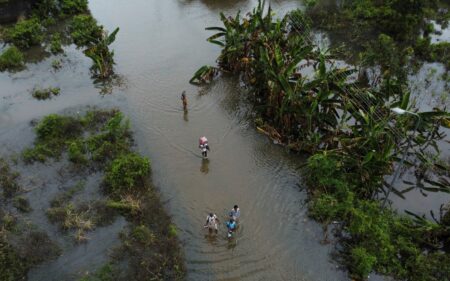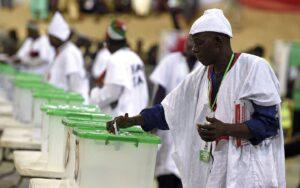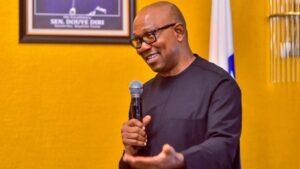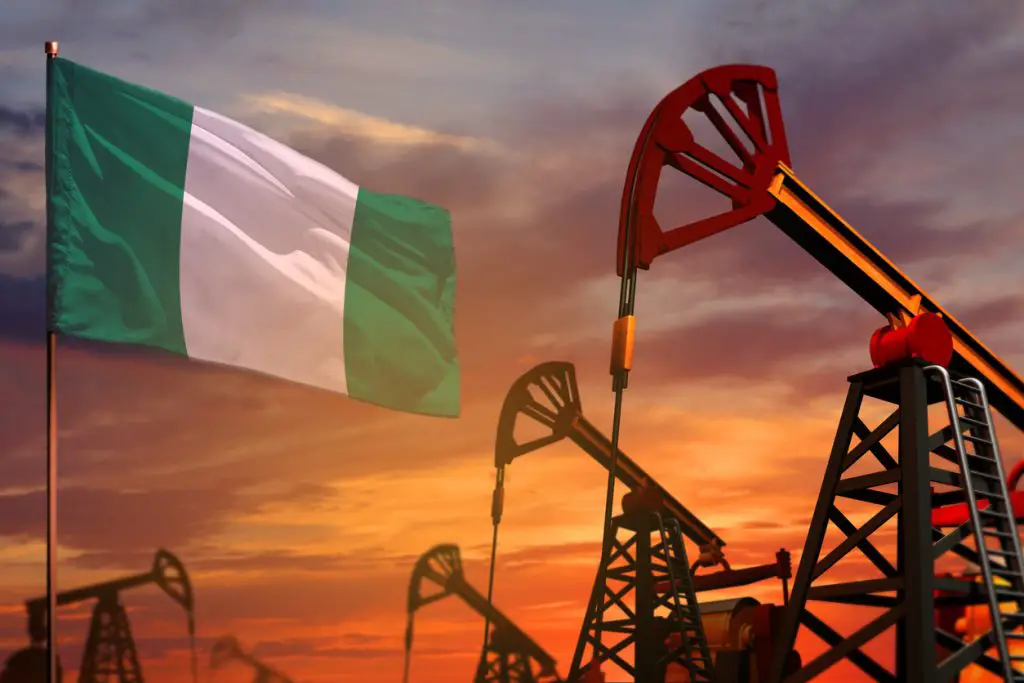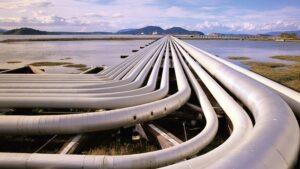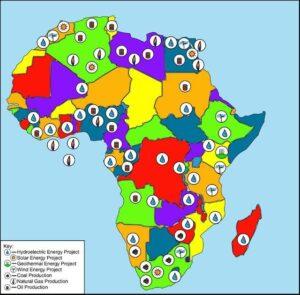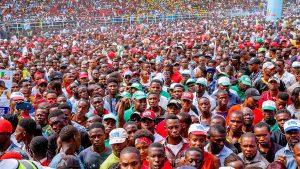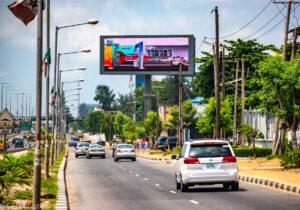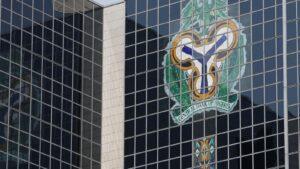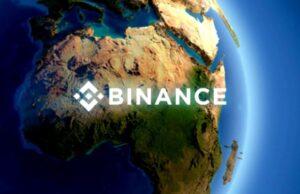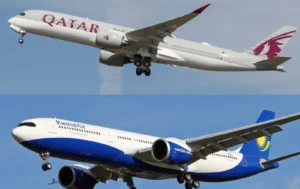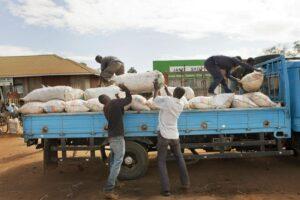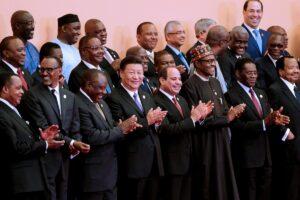- Africa’s new dawn: the rising role of digital and AI in agriculture
- Can Dangote Refinery Transform Africa Energy Ambition
- Gallup Survey: 80 per cent of Kenyan Workers Are Disengaged and Seek New Opportunities
- Madagascar Man Freed from 5KG Tumor After 15-Year Struggle
- How women in Africa are perceived and treated
- Sugar consumption in Kenya to Increase to 1.23 Million Tonnes
- Can Somalia and Turkey Oil deal Bring Change in Somaliland
- Remittances to Kenya dropped to $371.6 million in June, marking a six month low
Nigeria
- Climate Change-related flooding saw large swathes of farmlands and settlement areas in Nigeria’s coastal Niger Delta flooded by December 2022.
- Boko Haram terrorists, bandits, and armed herders have forced at least 78,000 farmers to abandon their farmland.
- Over the past eight years, an estimated 6,000 Benue people reported killed while two million farmers were displaced.
Nigeria is battling a perfect storm with a double whammy of climate change and conflict exacerbating the country’s food crisis. Currently an estimated 25.3 million people in Nigeria are facing food crisis partly worsened by the ongoing flooding throughout the country.
As of December 2022, large swathes of farmland and settlements in Nigeria’s coastal Niger Delta region flood. The flooding saw the closure of schools, leaving hundreds of children out of learning centres as the disaster took a toll.
Climate change worsening Nigeria’s food crisis
Nigeria, which with 222.2 million people is Africa’s most populous …
- At the beginning of February, Nigerians started complaining that commercial banks could not supply individuals with Nigeria’s physical fiat currency.
- The currency situation in Nigeria escalated to an all out crisis this week when an impending deadline for the ban of the use of old notes.
- The Supreme Court on Wednesday, suspended the deadline to ease the tension that has been building up exacerbated by heated campaigns and a looming fuel crisis.
In the middle of intense campaigns that will see three main presidential candidates battle it out in Nigeria’s 2023 election, the country is experiencing a shortage of the new Naira notes that threatens to take centre-stage before the West African nation goes to the polls from 25 February.
All Progress Party (APC) candidate Bola Tinibu, People’s Democratic Party (PDP) Atiku Abubakar and outsider Peter Obi of Labour Party are considered the front runners to take over from outgoing …
Some have wondered whether Obi will manage to upset the status quo that has defined Nigerian politics since 1999. However, great support for Obi has been borne of the young generation’s apparent frustration with Nigeria’s political class.
More specific, many people view the presidential candidates from the two major political parties, APC and PDP, as representatives of status quo politics that have left Nigeria on the brink of economic shutdown.
In the run-up to Nigeria’s presidential elections in 2023, the electorate confronts the challenges of soaring inflation, a plummeting currency, and prevalent insecurity. Crude oil, Nigeria’s economic backbone, has seen its production slump to multi-decade lows. Moreover, the government has seen its debt service exceed the earned revenue in the first quarter of 2022.…
It is now possible to store, buy, exchange and resell Nigerian naira for bitcoin and a hundred other cryptocurrencies directly from the Binance platform.
The Chinese giant headquartered in Malta is opening up to the fiat currencies of Africa’s largest economy. And for the occasion, it is the Nigerian naira that will serve as a trial balloon.
- Cryptocurrency exchange platforms are generally available to holders of euros or dollars, it is now the turn of the Nigerian naira are to be accepted
- Binance has adopted African currencies and is looking at Kenya and South Africa as well.
- Cryptocurrencies are now competition for Western Union and Moneygram
In an October 24 2021, press release, Binance explains that this milestone was reached thanks to a partnership with Nigerian fintech Flutterwave, which offers secure payment solutions for small entrepreneurs in 150 different currencies. In a second press release, Binance announces that it will …
President Buhari of Nigeria is keen to complete critical infrastructure projects as elections approach next year.
One of these projects is the Lagos light rail train project, which has gathered dust for decades. The project is back in motion, with the state government optimistic that the first phase of the Blue Line – one of the two lines to form the Lagos Rail Mass Transit (LRMT) system – will be operational this year.
Power infrastructure is a crucial area of interest. The country is rushing on the six-year multi-billion-dollar pact with German company Siemens to expand and revamp the dysfunctional national grid to unlock at least 25,000 megawatts (MW) of electricity by 2025.
On the renewable energy side, the government is working on the 3,050 MW Mambilla Hydropower Project in Taraba, which has dragged on for over 40 years despite significant budgetary allocations.…
- Cross River State has invited investors into various sectors of its economy, as part of plans to grow its economic development
- The southern Nigerian state also has several opportunities in the green economy, mostly in agribusiness
- Cross River State also offers opportunities in the blue economy, including at the port, as well as shipping
The government of Cross River State has invited investors into various sectors of its economy, as part of plans to grow its economic development.
The CEA of Cross River State Francis Ntamu told The Exchange Africa exclusively that there were several opportunities including in the green and blue economies.
The southern Nigerian state also has several opportunities in the green economy, mostly in agribusiness.
“We have rich tropical rain forests and endangered species of butterflies which have been of keen interest to environmentalists,” Ntamu said, adding that such an environment is ideal for investors interested in …
The former Federal Inland Revenue Service (FIRS) chairman, Babatunde Fowler, announced Nigeria’s decision to tax digital transactions in 2019. The new legislation dubbed The Finance Act (2021) was signed on December 31, 2021.
A section on Nigeria’s Finance Act focuses on capturing value from non-resident technology companies and calls them to act as VAT collectors for digital goods and services traded within Nigeria. The minister for finance, budget and national planning, Zainab Ahmed, said during the presentation of the 2022 budget that the taxable digital platforms include apps, high-frequency trading, electronic data storage, online advertising, and several others.
In addition, Meta had already issued a notice on December 9, 2021, before releasing the new financial regulation, saying that Meta ads in Nigeria would be subject to a value-added tax (VAT) at the applicable local tax rate. The VAT applies to advertisers whose “Sold to” country on their business or personal …
- The evolution has allured intensive participation in the lending sector, stimulating the growth of the Nigeria Domestic Credit by 16.2 per cent year on year as of December 2021.
- There is no lending limit for the MFBs, and the Central Bank of Nigeria charges N400,000 to N500,000 for their registration. Operations are limited to Lagos State.
- The Money Lenders license is issued and regulated by the money lenders laws of the 36 states in Nigeria.
The business of lending in Nigeria has metamorphosized from the traditional system to a more digitally enabled flexible system for a faster and more convenient process.
The evolution has allured intensive participation in the lending sector, stimulating the growth of the Nigeria Domestic Credit by 16.2 per cent year on year as of December 2021.
The present state of the Nigerian economy, the need to expand for companies and businesses, and the insatiable desire for …
Recently, many Nigerians trading on the Binance platform complained about initiating or completing transactions.
Some of the affected persons have taken to social media calling out crypto for “targeting Africans, especially Nigerians”, as their accounts have been suspended for reasons oblivious to them.
Some users say that they have been told to contact the Federal Bureau of Investigation (FBI) and New York Police Department to resolve transactions issues, a situation they claim to be absurd.…





